Open a new account
Account Login
Thank you for visiting xtrade.com
You are currently viewing our global website which is not directed at EU residents.
Please let us know how you would like to proceed.
How Volatility Contributes to Effective Crypto Trading
What is Digital Currency?
The cryptocurrency boom is alive and well down under. Digital currencies a.k.a. crypto
exists on the blockchain, over the Internet. There are currently well over 11,000+
cryptocurrencies available to traders, investors, speculators, and everyday folks all over
the world. The most popular cryptocurrencies include the likes of Bitcoin (BTC), the gold
standard, Bitcoin Cash (BCH), Cardano (ADA), Ethereum (ETH), Dogecoin (DOGE), Stellar Lumens
(XLM), Ripple (XRP), and Litecoin (LTC).
Despite the fact that some 11,000+ cryptocurrencies exist, the market remains heavily tilted
in favour of the top 10 digital currencies, which together account for the lion’s share of
the total market capitalisation. Consider the following top 10 cryptocurrencies:
- Bitcoin (BTC)
- Ethereum (ETH)
- Cardano (ADA)
- Binance Coin (BNB)
- Tether (USDT)
- Solana (SOL)
- Ripple (XRP)
- Dogecoin (DOGE)
- Polkadot (DOT)
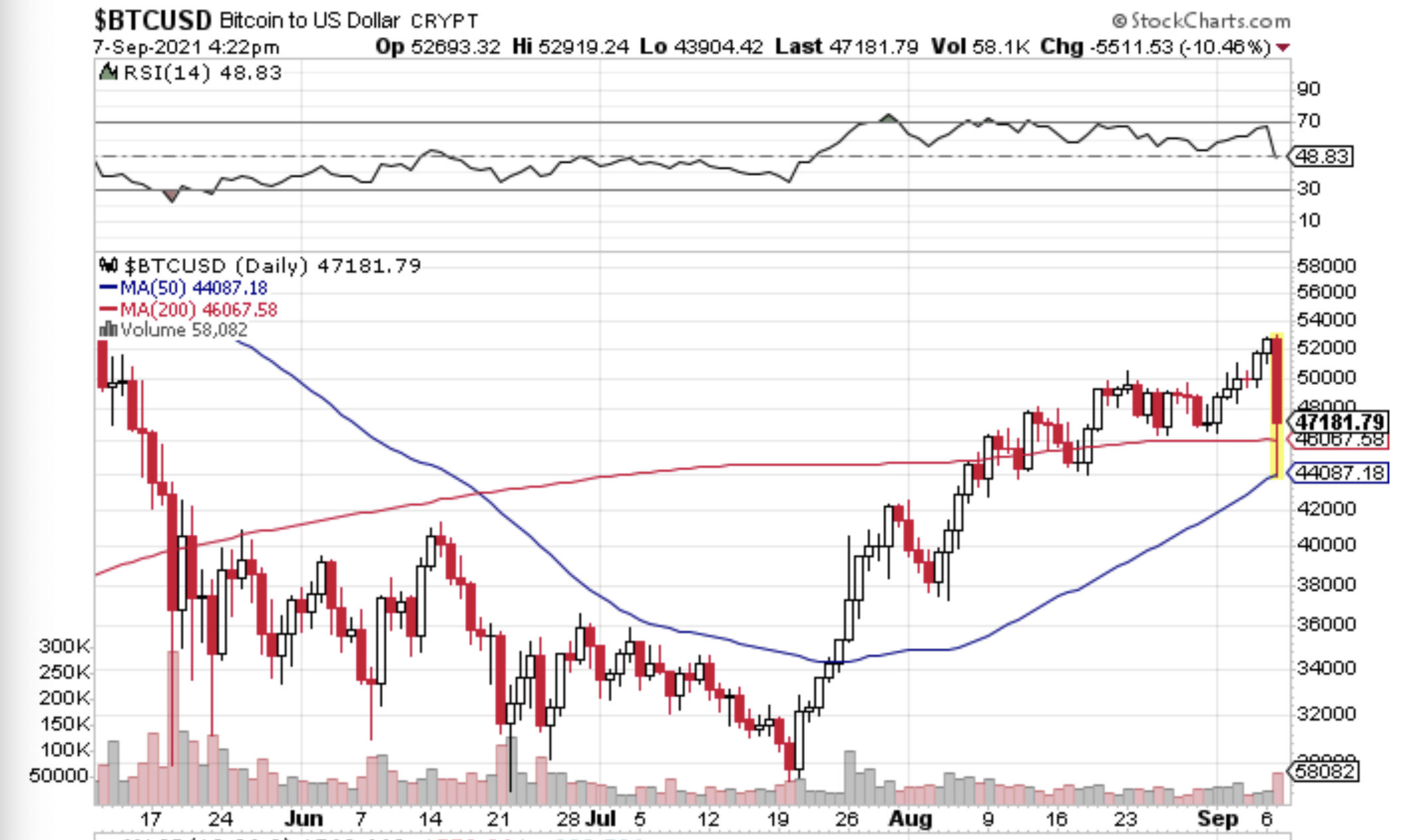
The volatility of cryptocurrencies is notable, and rapid daily price swings are entirely
possible. Despite a heavy concentration of assets in the top 10 cryptocurrencies, the market
is really dominated by the top 5. Combined, these comprise well over 70% of the entire
digital currency market. That means the market capitalisation of the 11,000+
cryptocurrencies only makes up 30% of the total market capitalisation.
It comes as no surprise that Bitcoin (BTC) is the rock star of the digital currency market.
The popularity of Bitcoin has skyrocketed in recent years, and this digital currency remains
the gold standard in the industry. Not only does Bitcoin have incredible brand awareness
among devotees, it's also well-known by people that have little or no interest, or
understanding of the cryptocurrency market.
As far as Ethereum goes, this digital currency was conceptualised by Vitalik Buterin several
years after Bitcoin was launched. ETH is a peer-to-peer, open source blockchain technology
where adoptees can create decentralised applications on the Ethereum blockchain. These are
known as dapps. Over the years, Ethereum (ETH) has become one of the most attractive digital
currencies for adoptees, with daily trading volumes often rivalling that of Bitcoin. It is
worth pointing out that Bitcoin doesn’t always have the greatest trading volume, because
Tether (USDT), a stablecoin, routinely trades at significantly greater volumes.
Cryptocurrencies a.k.a. digital currencies operate outside the realm of established
financial systems. They are decentralised and not subject to the whims of central banks, and
government oversight agencies. Neither do they rely on third-party representatives in the
financial arena, with existing legacy systems. Bitcoin (BTC) was the breakthrough
cryptocurrency, spearheaded by an enigmatic individual, entity, or group of people known as
Satoshi Nakamoto.
The reason for Bitcoin’s creation was published in the Bitcoin White Paper. Among others,
the White Paper stressed the need for a fully decentralised digital currency as an
alternative to fiat currency and legacy systems. Bitcoin allows for rapid, cost-effective,
anonymous transactions processing between senders and receivers. Since it operates on the
blockchain, transactions are immutable and double spending is impossible. Among the many
benefits of owning, trading, and using cryptocurrency are the following:
- Cryptocurrencies do not require legacy systems, financial intermediaries, or middlemen to help process transactions.
- It is possible to code financial derivatives (loans and trading strategies) into the blockchain, thereby removing the need for financial intermediaries.
- The blockchain allows swift asset transfers, with third-party approval at later dates.
- Thanks to the decentralised nature of blockchain technology, only the sender/receiver are involved in transactions processing. This eliminates uncertainty, misinformation, delays, and reduces costs.
What is Crypto Trading All About?
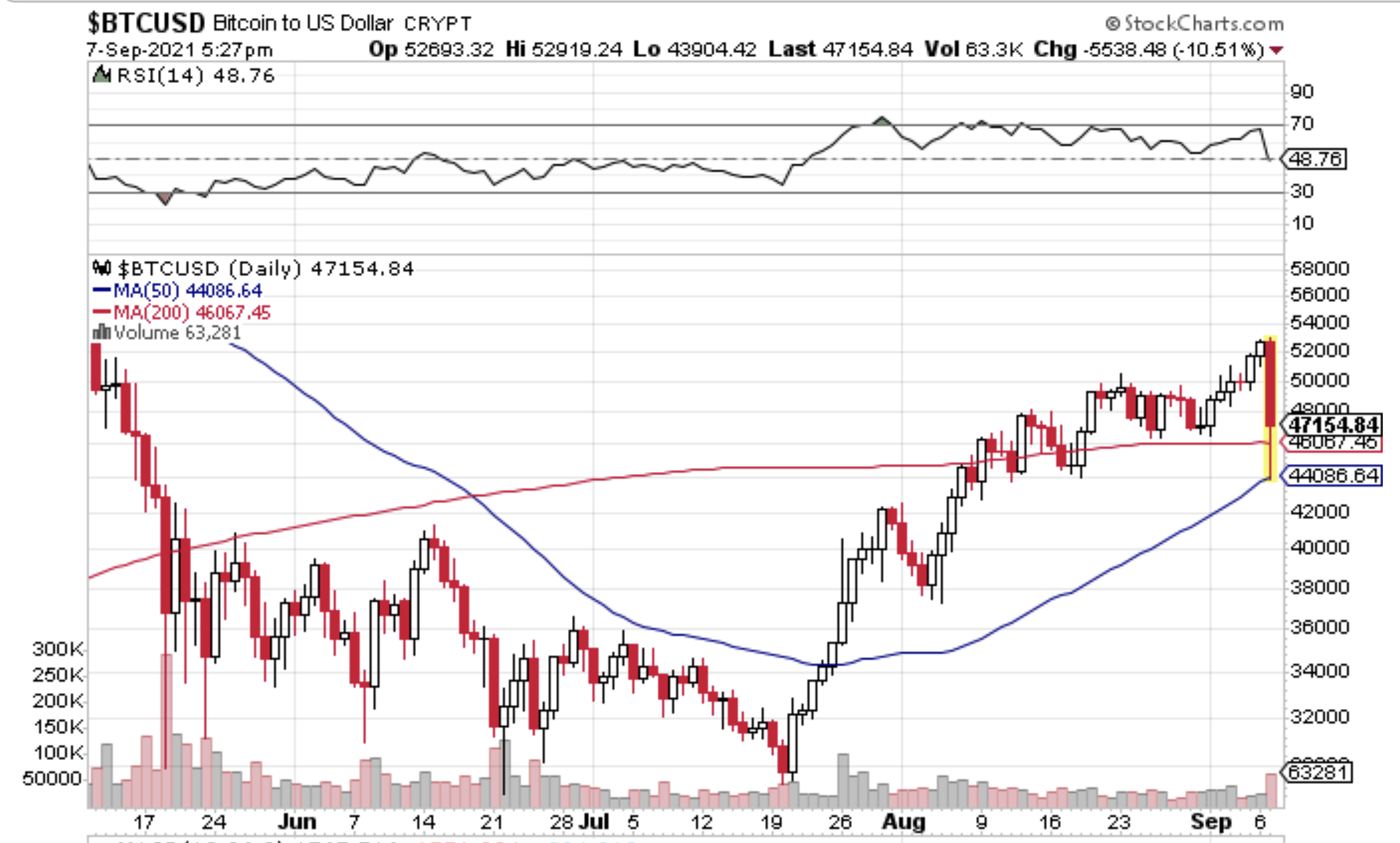
Source: StockCharts BTCUSD September 2021
Cryptocurrency, like foreign exchange, can be traded online. Xtrade Australia is a fully
regulated brokerage which facilitates CFD trading for you. There are several ways to trade
crypto. A popular option is crypto versus crypto, or crypto versus fiat. The latter refers
to fiduciary currency i.e. coins and banknotes, and is issued by the central bank of every
country. Typically, you will see crypto quoted against the top fiat currencies such as the
AUD, GBP EUR, or USD. When quoted this way, you can instantly gauge the value of 1 unit
cryptocurrency and the equivalent AUD, GBP, EUR, or USD amount.
At Xtrade Australia, you can easily trade any underlying financial instrument across
multiple different categories. These include digital currencies, exchange traded funds,
stocks, bonds, indices, forex, and commodities. When you trade one of these assets, you are
buying/selling the assets with the intention of generating a profit. In a traditional sense,
trading requires you to buy low and sell high.
However, with crypto trading it’s possible to trade in rising or falling markets. In other
words, you can short cryptocurrency when your expectations are bearish. Short selling is a
common trading tactic with day traders. The profits generated through short selling are the
difference between the buy price & the sell price. With a short sale, you sell the financial
instrument now and hope to buy it back later at a cheaper price, pocketing the difference.
Caution:
Cryptocurrency markets are inherently volatile and wild price fluctuations can take place at
any given time. It's important to have a risk mitigation strategy in place to guard against
unfavourable price movements. Australian traders can use market orders, limit orders, and
stop loss orders at Xtrade’s powerful trading platforms.
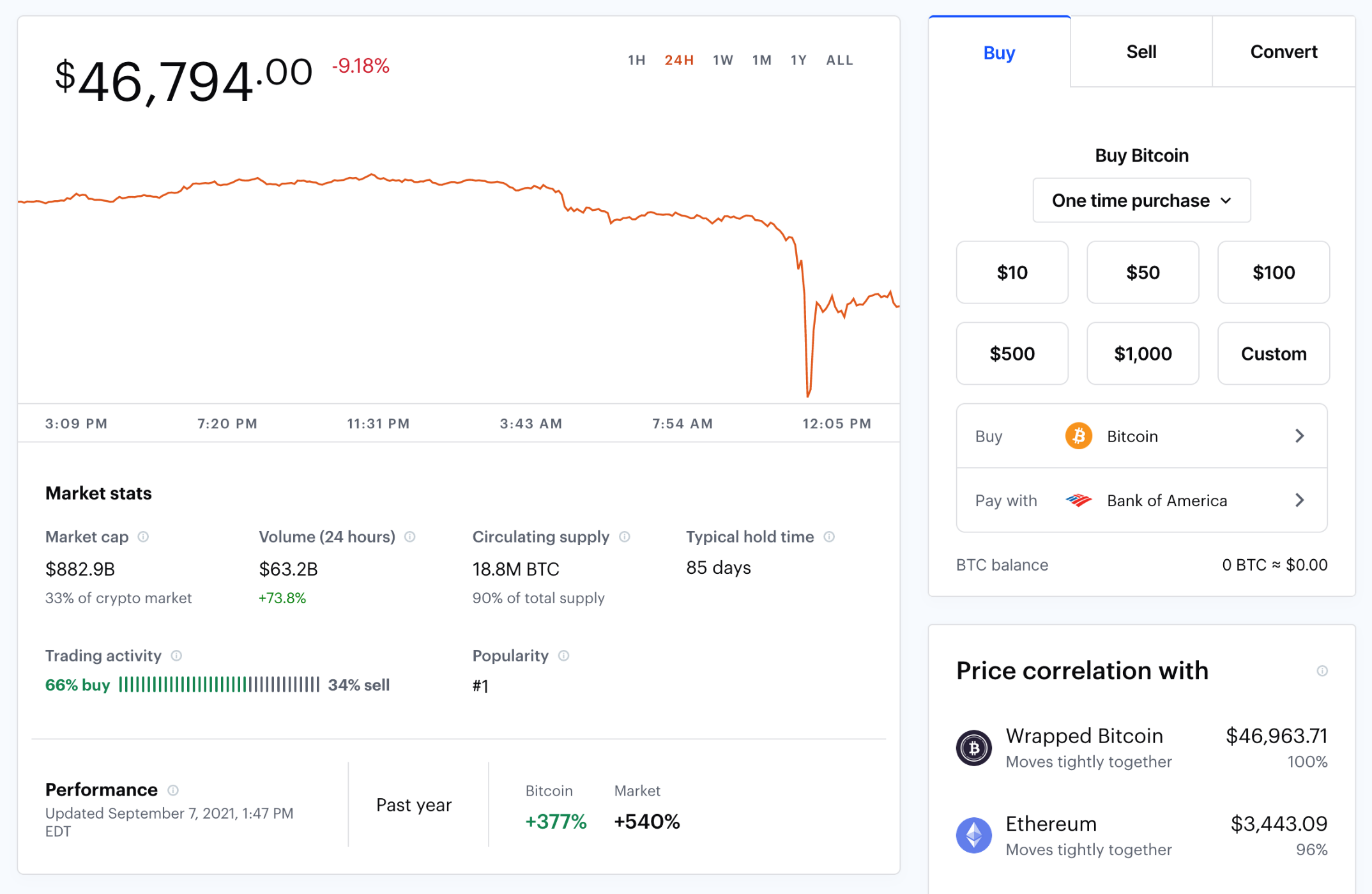
Source: Bitcoin (BTC) Coinbase
Whipsaw price movements are common with cryptocurrency. At any given time, prices can rise
or fall dramatically. Crypto price movements are unlike ETFs, commodities, indices, bonds,
or even forex. There are different types of traders and investors with crypto. Many prefer
to buy and hold, otherwise known as HODL digital currency, hoping for long-term price
appreciation. For an investor, the short-term horizon is irrelevant.
The price wobbles are accepted as part of the inevitable move towards an upward sloping
long-term price chart. That's precisely what has happened with Bitcoin since 2009, Litecoin
since 2011, and Ethereum since 2015. Similar charts are evident with other cryptocurrencies
across the board. Today, several ranking cryptos are worth thousands of dollars apiece, with
virtually unlimited upside potential available. For traders though, it's all about
capitalising off short-term price movements.
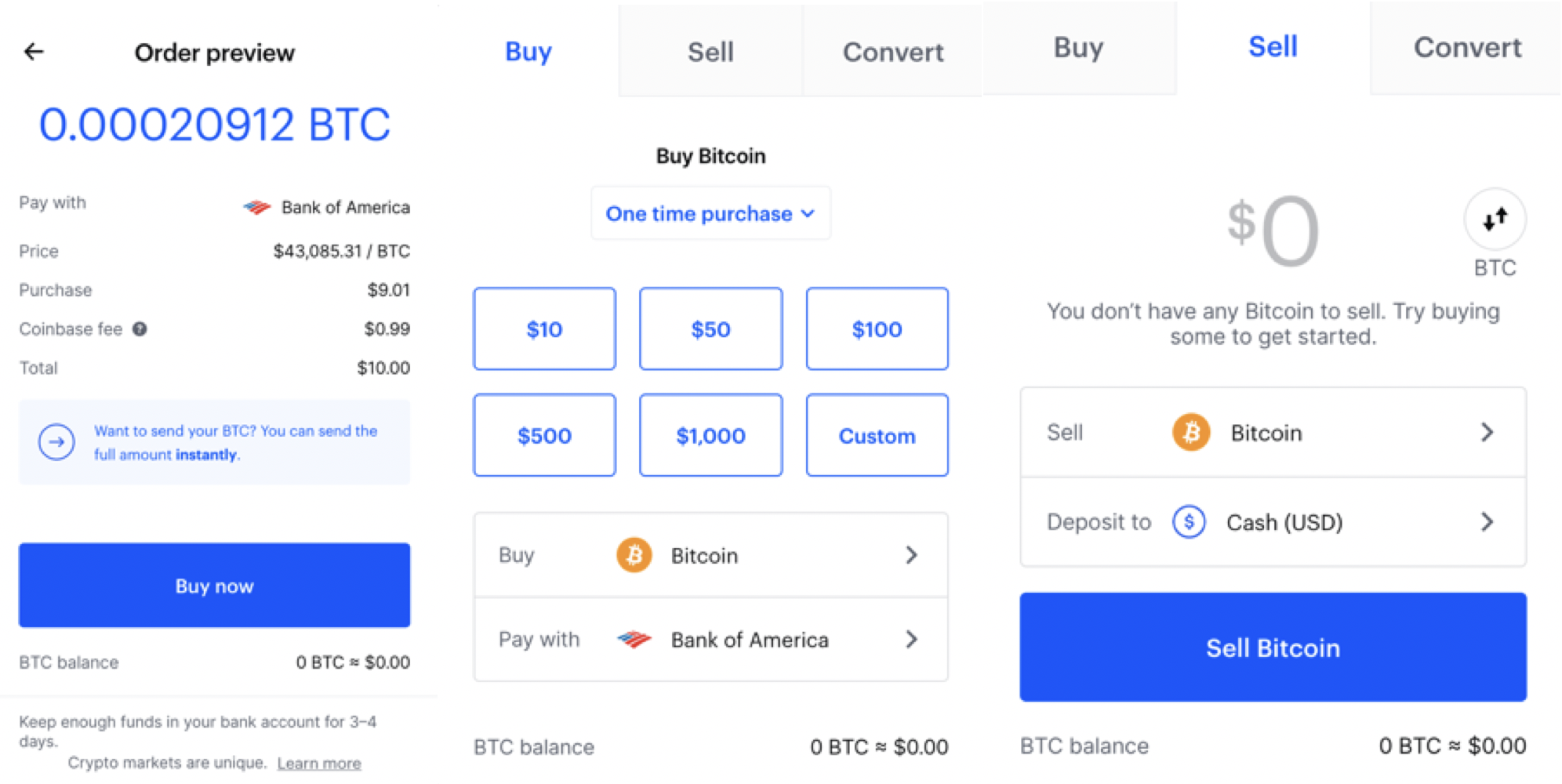
Source: Coinbase Buy & Sell Bitcoin (BTC)
There are several ways to get started with crypto trading in Australia. The first order of
business is determining how you would like to trade digital currencies. The traditional
method of registering at a cryptocurrency exchange and actually buying digital currencies
such as Bitcoin, Ethereum, Litecoin, Cardano, Bitcoin Cash, Dogecoin, Ripple, and the like
is certainly possible. Register an account with a reputable crypto exchange such as Swyftx,
Digital Surge, Independent Reserve, CoinSpot Exchange, Binance Exchange, Easy Crypto
Exchange and others. It is easy to start trading with fiat currency such as Australian
dollars, New Zealand dollars, or US dollars, or in digital currency such as Bitcoin,
Ethereum, Litecoin, etcetera.
For many cryptocurrency enthusiasts, the thought of storing crypto at an exchange is
unappealing. This is largely a result of multiple hacks over the years at top-tier exchanges
such as BitGrail, Coincheck, Mt Gox, and Bithumb. For this reason, traders and investors
tend to prefer external cryptocurrency wallets such as the Ledger Nano for safely storing
the codes for digital currency. There are many other ways to dabble in crypto, such as
indirect crypto trading options with GBTC Trust, Square Cash App, or even Grayscale Trust.
The CME Micro Bitcoin Futures market is yet another option to consider, with full on risk
mitigation potential geared towards capital efficiency of operations.
Here at Xtrade Australia, it's all about derivatives trading. As the name suggests, a
derivative is a type of trading instrument which derives the price from the underlying
financial instrument. These derivative trading instruments are known as CFDs. Contracts for
Difference are available for different asset types such as Ethereum CFDs, Bitcoin CFDs,
Litecoin CFDs, et al. With a derivative, you don't ever own the underlying asset. You’re
simply trading price movements of the financial instrument. Another benefit of trading
crypto CFDs is the availability of leverage on trades. You can maximise the trading power of
your capital by a multiple, courtesy of the broker. With a CFD, the trader and the broker
agree to exchange the difference in value between the opening price and the closing price of
the financial instrument.
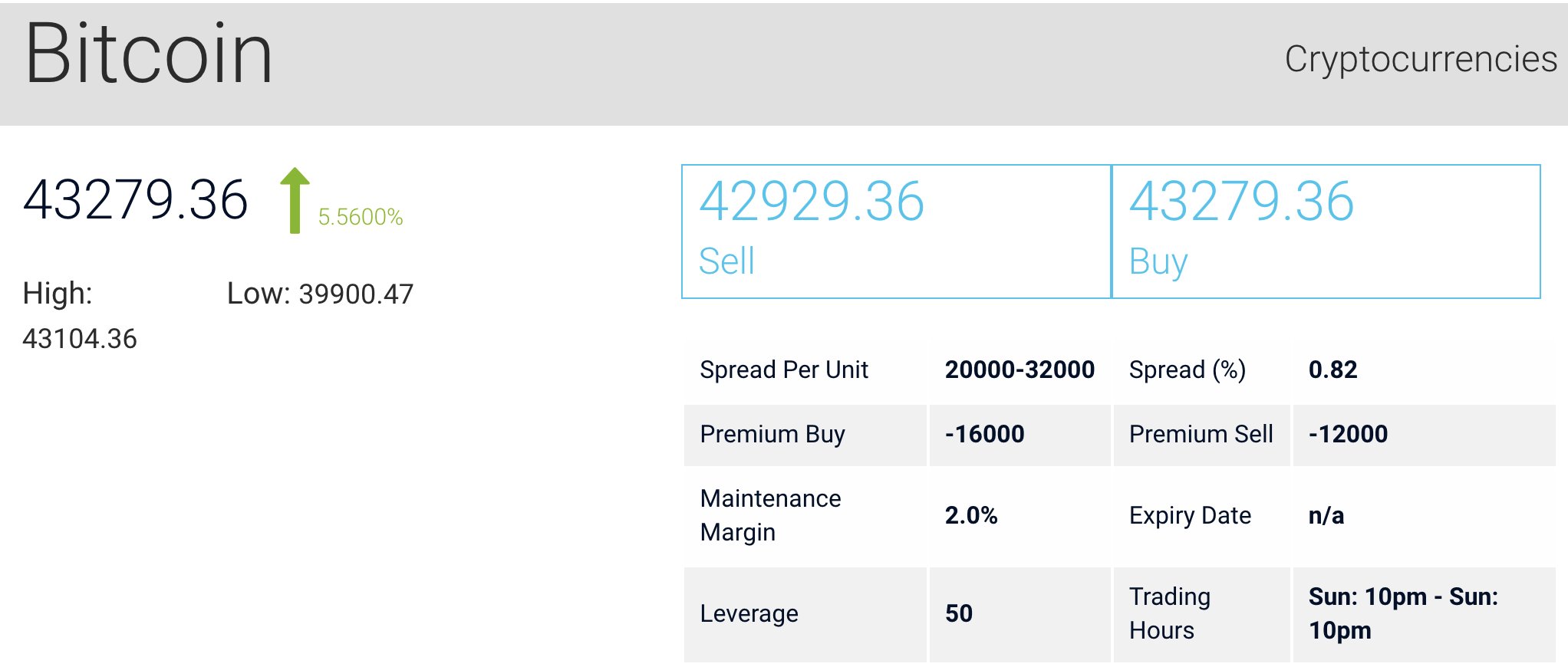
Source: Xtrade Australia Bitcoin CFDs
At Xtrade Australia, traders can easily buy or sell the cryptocurrency, with speculative
insights about price movements. The price of the Bitcoin CFD mirrors the price of Bitcoin -
the underlying financial instrument. CFDs are not without their fees, charges, or
commissions. Each broker is different. Costs include premium sell, spread percent, and
maintenance margin. It is important to trade cautiously with crypto. These financial
instruments have whimsical price movements, often rising or falling dramatically on nothing
more than sentiment. Careful attention to detail is required when trading crypto CFDs.
Speculative sentiment determines how prices are likely to move.
At Xtrade Australia, the following leverage is applied to our list of CFD financial
instruments:
- 2:1 for CFDs referencing crypto-assets.
- 5:1 for CFDs referencing shares or other assets.
- 10:1 for CFDs referencing a commodity (other than gold) or a minor stock market index.
- 20:1 for CFDs referencing an exchange rate for a minor currency pair, gold or a major stock market index.
- 30:1 for CFDs referencing an exchange rate for a major currency pair.
Risk Disclaimer: CFD trading is inherently risky, and not suitable for all types of traders
Caveat: It is important to understand that traders are liable for the full value of the trade, not simply the margin requirement.
Top Brokers that Offer Cryptocurrency Trading
Your choice of broker is an important consideration. To this end, only licensed and regulated brokers will suffice. Many brokers today operate in unregulated markets, making it highly risky for traders to deposit funds into their accounts. It's always best to safeguard your investment by sticking with credible brokers. Experts recommend using the following brokers for cryptocurrency trading purposes:
- eToro
- XTrade
- Swyftx
- Binance
- CoinSpot
- Digital Surge
This is but a small sampling of a wide range of reputable derivative trading platforms,
Cryptocurrency exchanges, and brokers that may be available to you in Australia. Not all
brokers are cut from the same cloth. Its best to assess the broker's offerings against your
preferences. For traders who prefer to own digital currency (Litecoin, Bitcoin, or
Ethereum), CFD trading is not the way. The better option is a cryptocurrency exchange where
you can actually exchange crypto for crypto, or fiat for crypto and store it in a wallet.
If you are driven by profit potential alone, then CFD trading will serve you well. You don't
have to worry about storing your cryptocurrency since you are trading contracts. No digital
currencies change hands between yourself and the platform, or other traders. Recall that
CFDs are derivative instruments where price movements are mirrored, and traders can buy and
sell at leisure. It is a high-risk proposition and traders can lose their capital with CFDs.
Other CFD options include the likes of futures (inherently risky), with higher potential
rewards.
Nowadays, most brokers offer a limited selection of digital currencies to trade – not all
11,000+ of them – including XRP, LTC, BTC, and ETH.
Online Crypto Trading and Crypto Platforms
There are notable differences between different types of crypto trading platforms. These are
largely related to the features and functions that trading platforms offer. Many Australian
crypto trading platforms provide derivative trading in the form of CFDs. These leveraged
financial instruments present traders with opportunities and challenges. When you speculate
on the future price movement of an underlying financial instrument and you are correct, the
CFD can finish in the money. However, if the trade goes against you, losses can also result.
Trading cryptocurrency CFDs on margin is a high-risk activity, given the volatile nature of
this market.
At cryptocurrency exchanges, Bitcoin, Litecoin, Ethereum, Ripple, Dogecoin and other digital
currencies are traded as assets. You can store these digital currencies at the crypto
exchange, or in a wallet.
This website uses cookies to optimize your online experience. By continuing to access our website, you agree with our Privacy Policy and Cookies Policy . For more info about cookies, please click here.
or